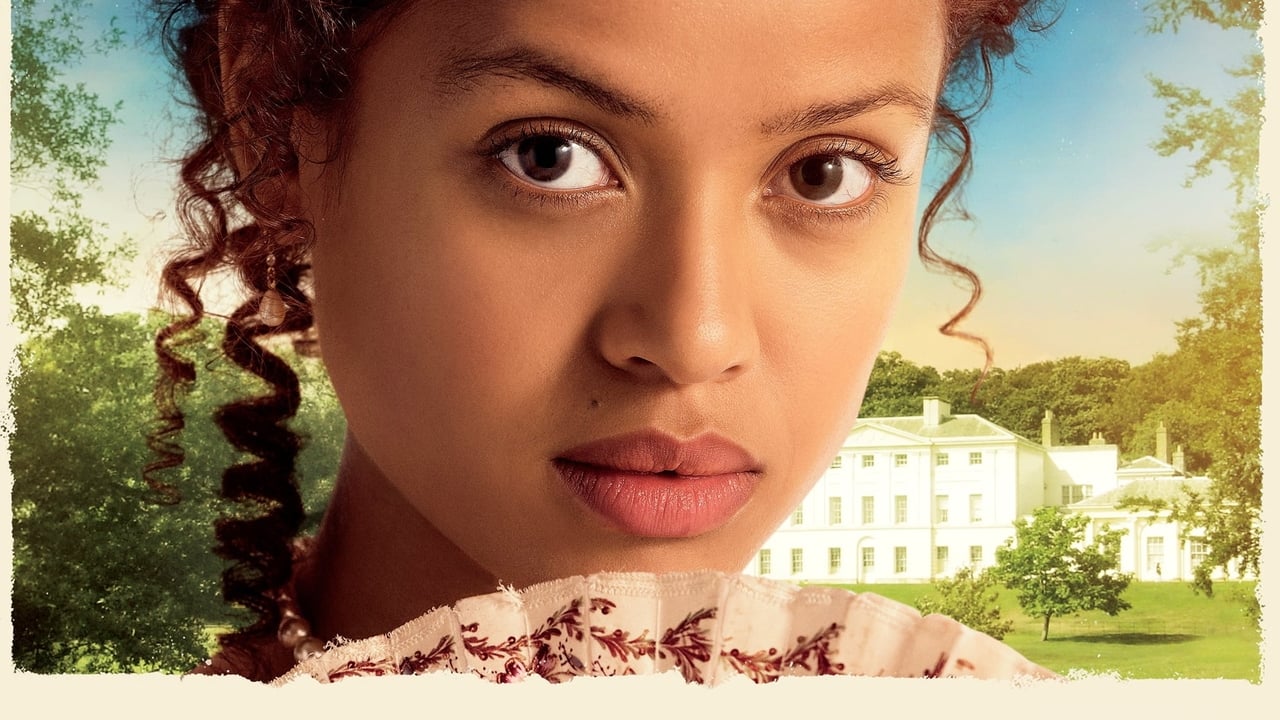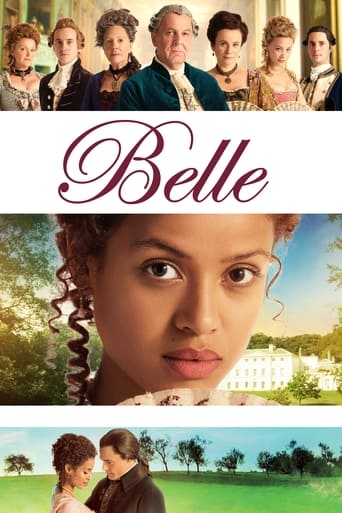

I heard about this film once or twice during its release in cinemas, I later found out about the good cast in it, and it did look and sound interesting, so I gave it a chance. Based on a true story, and inspired by the 1779 painting of the title character, Dido Elizabeth Belle Lindsay (Gugu Mbatha-Raw) was born in 1761, the natural daughter of enslaved African woman Maria Belle from the West Indies, and British Royal Navy officer Captain Sir John Lindsay (Matthew Goode). After Dido's mother's dies in 1765, Captain Lindsay takes her from the West Indies slums and entrusts her to his uncle William Murray (Tom Wilkinson), 1st Earl of Mansfield, the Lord Chief Justice, and his wife Elizabeth (Emily Watson), who live in the estate Kenwood House, in Hampstead outside London. Lord and Lady Mansfield raise Dido as a free gentlewoman, along with their niece Lady Elizabeth Murray (Sarah Gadon), who came to live with them after her mother died and her father remarried. The two cousins reach adulthood, an oil portrait is commissioned, but Dido is unhappy sitting for it, worried she will portrayed as a black servant, rather than as an aristocrat. Dido's father dies and leaves her a generous sum of £2,000 a year, enough to make her an heiress, in contrast, Lady Elizabeth will have no income from her father, as his son from his new wife will become sole heir. A coming-out to society party is arranged for Elizabeth, but Lord and Lady Mansfield believe no gentleman will agree to marry Dido because of her mixed-race status. Lord Mansfield agrees to take a vicar's son, John Davinier (Sam Reid), into an apprenticeship for law, he becomes part of the Zong massacre case, this was the mass killing of 133 African slaves by the crew of the British slave ship Zong. During preparations for the court case, John gets very close to Dido, because of his interest in the cause of the abolitionists, Lord Mansfield tells him not to see her anymore, and ends his apprenticeship. Dido's aunts, Lady Mansfield, and her sister Lady Mary Murray (Penelope Wilton), seek to steer Dido into an engagement with Oliver Ashford (James Norton), younger brother of the bigoted James Ashford (Harry Potter's Tom Felton). James starts courting Elizabeth, but stops when he realises she has no inheritance, with no fortune Oliver proposes to Dido and she accepts, but she continues to see John, James takes Dido aside and says she will disgrace his family's name, then insults and manhandles her. Dido later tells Elizabeth of his true character and says she will give her part of her inheritance to help her find a new match, Lord Mansfield finds out about Dido and John seeing each other and confronts them, John professes his love for her, and later Dido meets with Oliver and breaks off their engagement. Dido is relieved when the oil painting is revealed, she is shown as Elizabeth's equal, she tells Lord Mansfield this proves that convention can be defied, he is ruling over the Zong case, he sees John and Dido outside the court, he says that she can only marry a gentleman, so reinstates John's apprenticeship, so he can become a lawyer. Dido and John share a kiss, acknowledging their romantic feelings, they went on to get married and had three children together, Elizabeth also married and had children, and their painting hangs at Scone Palace in Scotland, the birthplace of Lord Mansfield. Also starring Miranda Richardson as Lady Ashford, Alex Jennings as Lord Ashford, Lauren Julien-Box as Young Dido and Cara Jenkins as Young Elizabeth. Mbatha-Raw gives a good leading performance as the mixed-race aristocrat, taken from the slums into a life of luxury, the supporting cast including Wilkinson, Felton and Norton do well also, it is essentially a story examining aristocracy overcame racism of the time, and a simple men and women of wealth courting with great costumes, all in all it is a reasonably interesting period drama. Worth watching!
... View MoreI wish something more positive could be said about Amma Asante's film. It is so eager to please with its sumptuous sets and costumes, its use of historic locations (including London's Kenwood House), and its precise attention to historic detail.Yet there is a fatal flaw at its heart. The reason is that the director does not seem to know whether they are making a love-story, a piece of social commentary with direct significance to today, or a heritage film, or all of them. Dido (Gugu Mbatha-Raw) is a mixed race girl living in a bourgeois household under the protection of Lord Mansfield (Tom Wilkinson). Although theoretically free, she is denied most of the privileged due to her white relatives and remains the butt of casual racism from a variety of sources, including Lady Ashford (Miranda Richardson), and her son James (Tom Felton). She finds a sympathetic ear in John Davinter (Sam Reid) who after a series of debates with Lord Mansfield, eventually wins him over and they live happily ever after.Yet that love plot is complicated by the politics, centering over a legal case trying to determine whether some ship-owners were directly responsible for the death of a group of slaves. This is a true story, the outcome of which precipitated significant reform in the anti-slavery laws at the end of the eighteenth century. For contemporary viewers the topic has particular significance as it evokes similar sufferings experienced by contemporary refugees as they desperately board boats in an effort to escape their war-torn states, only to find themselves exploited by unscrupulous profiteers.Yet DIDO perpetually shirks this issue in favor of visual clichés - the lengthy walk by costumed characters, the pretty-pretty sites of green landscapes lovingly photographed at sunset, the clip-clop of horses' hooves along immaculately soiled cobblestones. It is as if director Asante were deliberately trying to placate a readymade audience. In truth several of these sequences are boring, holding up what might have been a complex plot and thereby diverting our attention.
... View MoreJames Norton as the younger brother of Tom Felton who once again plays a foppish douche was enough of a contrast to take me out of the moment of the movie. Aside from that I became truly engrossed in the story of Belle as a rather large rock tossed into the still waters of the pressures to find "an acceptable match" for your children and family in British society touching on inheritance and slavery in a way that made me think of Moneyball. The scene where the white Bette explains that she is more property than her Negro cousin Belle dug at the feminist in me. Lord and Lady Mansfield were quite empathetic and the discussions of law and class by them and many other characters were not dumbed down in any way. I do enjoy a movie that requires me to think.
... View MoreThis is a fine film based on an amazing true story. It is hampered by a pallid lead performance and an over-emphasis on the (mostly fictional) romance between Belle and John Davenier.There is a standout performance by Sarah Gadon, as Dido's sister- cousin. Tom Felton, James Norton, and Miranda Richardson also provide much needed spark.Little is known about Dido Belle, most of our impressions is based on the famous painting. However, the film's characterization fails to convey the charm and playfulness of the woman in the portrait. Instead, the lead actress is left to make 'serious' faces with furrowed brows, watery eyes, and heavy corset-breathing.Oddly, it is the romantic lead which is the catalyst. John Davenier opens Dido's eyes to the iniquities of the slave trade and her status, which is historically inaccurate and a disservice to the real- life individuals. The film seems more concerned with the romantic life of the heroine than exploring the relationship between her and her family. Dido was an unusual woman, but so was her family. It was her relationship with her uncle and his historic decisions which abolished slavery in Britain that makes her story relevant. The writer does a good job though, of portraying all the inequalities of Britain. Dido may be hindered by her race, but her cousin and others are no less hindered by their poverty and gender. And the film does a good job of exploring the complexities and difficulties of Dido's relationship with society.
... View More